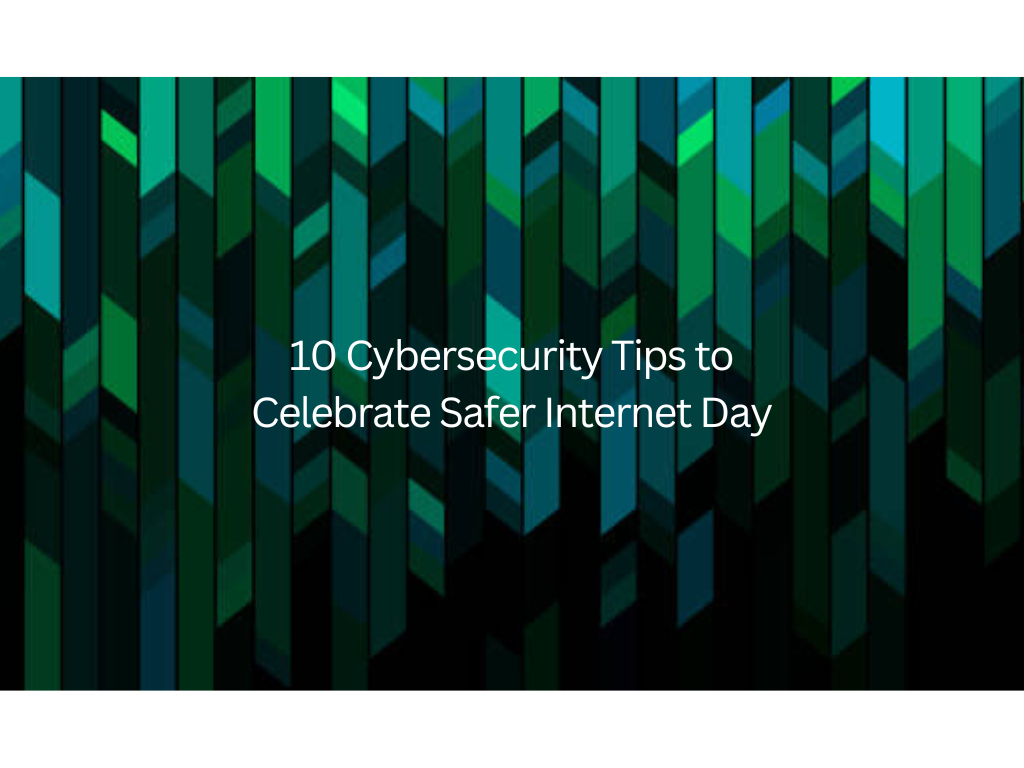Safer Internet Day is celebrated worldwide to raise awareness about online safety and empower users with tools to protect their digital lives. As our world becomes increasingly connected, cyber threats are on the rise. Now is the perfect time to review practical cybersecurity tips that help secure your online presence. In this article, we share 10 actionable tips—from using strong passwords to securing your home network—that you can implement today to celebrate Safer Internet Day and maintain a safer digital lifestyle.
1. Use Strong and Unique Passwords
Cybersecurity Tip #1: Use Strong and Unique Passwords for Safer Internet Day
Passwords are the first line of defense against unauthorized access to your personal data. A strong password should be a mix of uppercase and lowercase letters, numbers, and special characters. Rather than using easily guessable words or common phrases, consider creating a passphrase that is both memorable and complex. For example, instead of “Password123,” try something like “R3liable!Passphr@s3For2025.”
Using a password manager is highly recommended. These tools help generate, store, and autofill unique passwords for each account, ensuring you never reuse passwords across multiple sites. Remember, reusing passwords means that a breach on one site could compromise several of your accounts.
Key points:
- Create passwords with at least 16 characters.
- Use a password manager for secure storage.
- Avoid personal details such as birthdays or names.
2. Enable Multi-Factor Authentication (MFA)
Cybersecurity Tip #2: Enable Multi-Factor Authentication for Enhanced Online Security
Multi-factor authentication (MFA) adds an extra layer of protection beyond your password. With MFA enabled, even if someone gains access to your password, they will need a second factor—such as a code sent to your mobile phone or a biometric scan—to log in to your account. This extra step significantly reduces the likelihood of unauthorized access.
Most major platforms now offer MFA options, so take advantage of them on your email, bank, social media, and shopping accounts. Consider using an authenticator app for generating time-based codes or even a physical security key if available.
Key points:
- MFA protects your accounts even if your password is compromised.
- Use an authenticator app or a physical security key.
- Always enable MFA on sensitive accounts.
3. Keep Software and Systems Updated
Cybersecurity Tip #3: Keep Your Software Updated for Safer Internet Day
Outdated software is one of the easiest ways for cybercriminals to exploit vulnerabilities in your system. Developers release patches and updates to fix security flaws and improve overall performance. Whether it’s your operating system, web browser, or individual apps, regularly check for and install updates to ensure you have the latest protections.
Set your devices to update automatically if possible. Not only will this minimize the window of opportunity for attackers, but it also ensures that you benefit from the most current security features.
Key points:
- Enable automatic updates on your devices.
- Regularly check for patch releases and security updates.
- Updated software minimizes potential vulnerabilities.
4. Be Wary of Phishing Scams
Cybersecurity Tip #4: Recognize and Avoid Phishing Scams on Safer Internet Day
Phishing remains one of the most prevalent cyber threats. Cybercriminals use emails, texts, and even phone calls to trick you into revealing sensitive information like passwords or financial details. Often, these messages create a sense of urgency by claiming there is an account issue or an unexpected problem that requires immediate attention.
Always verify the sender’s email address and inspect any links before clicking. When in doubt, type the website URL directly into your browser instead of clicking on a link. Reporting suspicious emails to your IT department or directly to the service provider can also help prevent broader attacks.
Key points:
- Look out for urgent language and generic greetings.
- Verify the authenticity of emails and messages.
- Report any suspicious activity immediately.
5. Secure Your Home and Public Wi-Fi
Cybersecurity Tip #5: Secure Your Wi-Fi Connections for Safer Internet Day
Whether you are at home or on the go, ensuring that your Wi-Fi connection is secure is essential. At home, change the default router password and use a strong encryption method (WPA2 or WPA3). For public Wi-Fi networks—found in cafes, libraries, or airports—the risks are higher. Avoid accessing sensitive information on such networks, or better yet, use your mobile data or a secure personal hotspot.
If you must use public Wi-Fi, consider using a Virtual Private Network (VPN) to encrypt your connection and protect your data from eavesdroppers.
Key points:
- Change default router passwords and enable strong encryption.
- Avoid accessing sensitive data on public Wi-Fi.
- Use a VPN when connecting to public networks.
6. Use a Reliable Virtual Private Network (VPN)
Cybersecurity Tip #6: Use a VPN to Protect Your Online Privacy on Safer Internet Day
A VPN is a powerful tool for protecting your online privacy by encrypting your internet connection and routing your data through secure servers. This means that even when you’re connected to an unsecured public network, your data remains protected from hackers and prying eyes.
VPNs also allow you to bypass geo-restrictions, giving you access to content that might otherwise be blocked in your region. Look for a reputable VPN provider that offers strong encryption protocols and a strict no-logs policy.
Key points:
- Encrypts your internet connection to protect data.
- Helps bypass geo-restrictions and improves privacy.
- Choose a reliable VPN service with a good reputation.
7. Practice Safe Social Media Habits
Cybersecurity Tip #7: Practice Safe Social Media Habits for Safer Internet Day
Social media is an integral part of our digital lives, but oversharing can expose you to cyber threats. Review your privacy settings regularly to control who can see your personal information. Avoid posting details that might reveal sensitive information such as your home address, vacation plans, or financial details.
Be cautious about accepting friend requests or engaging with unknown contacts. Cybercriminals often use social media to gather personal data that can later be exploited in targeted scams or identity theft.
Key points:
- Adjust privacy settings on social media platforms.
- Limit personal information shared online.
- Stay alert to suspicious contacts or posts.
8. Educate Yourself and Others about Cybersecurity
Cybersecurity Tip #8: Educate Yourself and Your Community for Safer Internet Day
Knowledge is power when it comes to cybersecurity. Stay informed about the latest threats and learn how to protect yourself by following reputable sources, taking online courses, or participating in webinars. Sharing this knowledge with friends, family, and colleagues can create a safer digital community for everyone.
Encourage discussions about online safety and lead by example—whether it’s by following security blogs, reading cybersecurity newsletters, or joining online forums that focus on digital safety.
Key points:
- Stay updated with the latest cybersecurity news.
- Participate in cybersecurity training and share knowledge.
- Foster a culture of digital safety within your community.
9. Regularly Back Up Your Data
Cybersecurity Tip #9: Back Up Your Data to Prevent Loss on Safer Internet Day
Data loss can be devastating, whether it comes from a ransomware attack, a hardware failure, or accidental deletion. Regularly backing up your data ensures that you can recover important files and continue working with minimal disruption. Use a combination of cloud storage and external hard drives to create a robust backup strategy.
Set up automatic backups if your device supports them. Not only does this protect your data, but it also gives you peace of mind knowing that your personal and professional information is safe.
Key points:
- Use cloud storage and external drives for backups.
- Set up automatic backup routines.
- Data backups help you recover quickly from attacks or system failures.
10. Monitor and Report Suspicious Activity
Cybersecurity Tip #10: Monitor and Report Suspicious Activity for Safer Internet Day
Proactive monitoring of your online accounts and devices is essential to catch any signs of a cyber attack early. Many services offer alerts when unusual activity is detected, so be sure to enable these notifications. Whether it’s a sudden change in your bank account activity or an unexpected login attempt, quick detection can prevent further damage.
If you notice anything suspicious, report it immediately to your IT department, bank, or the appropriate authorities. Early reporting is key to mitigating the impact of a cyber incident.
Key points:
- Enable account alerts and monitoring tools.
- Report suspicious activity promptly.
- Early detection can significantly reduce damage from cyber attacks.
Additional Best Practices & Tools
While the 10 tips above form the core of your cybersecurity routine, there are extra practices that can further bolster your defenses:
- Secure IoT Devices: Change default credentials on smart devices and update firmware regularly.
- Browser Security: Always check for HTTPS and a padlock icon before entering sensitive information.
- Antivirus Software: Use trusted antivirus software to scan your devices regularly.
- Privacy Tools: Consider browser extensions that block trackers and malicious sites.
By integrating these additional measures, you create multiple layers of defense that protect you from a broad range of cyber threats.
Conclusion: Celebrate Safer Internet Day with Confidence
Safer Internet Day is a timely reminder to take a proactive stance on cybersecurity. By following these 10 tips, you can significantly improve your online safety and reduce your risk of falling victim to cyber attacks. Whether it’s by creating strong passwords, enabling multi-factor authentication, using a VPN, or educating yourself and your community, every small step adds up to a robust digital defense.
Embrace these best practices and encourage others to do the same—after all, a safer internet benefits everyone. Protect your digital life, spread the word, and celebrate Safer Internet Day by taking charge of your cybersecurity today!




